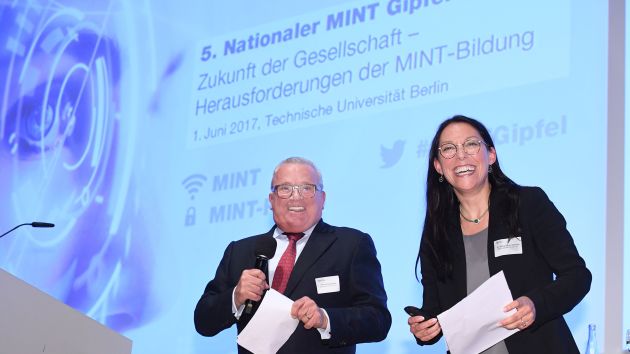The 5th National STEM Summit will focus on how STEM education can be conducted in the long term, while maintaining a high level of quality. Dr. Nathalie von Siemens, the spokesperson of the Nationales MINT Forum, said: “For this effort to succeed, we need holistic, long-term support for STEM education and collaboration among relevant STEM stakeholders.” She emphasized that a wide range of activities are being conducted along the entire educational chain, but added that Germany lacked a national platform that could assure quality and have a sustainable impact. “We are calling for the creation of a STEM alliance on quality assurance and are prepared to play a leading role in the process of reaching an understanding about it,” Nathalie von Siemens said.
During the political session of the summit set for the afternoon, Nathalie von Siemens presents six key recommendations on behalf of the Nationales MINT Forum. These ideas will then be discussed with the education policy spokespeople from German parliamentary parties: CDU/CSU, SPD, Bündnis 90/Die Grünen and Die Linke.
Core recommendations for future-proof STEM education
1.) All parties are called upon to make a constructive contribution to the development of a Digitalpakt#D to ensure that national, state and local governments can implement the plan in a timely manner, thus making up for lost ground regarding digitalization in education. The key thereby is systematic initial and advanced training for teachers.
2.) Political leaders are urged to join the Nationales MINT Forum in creating an alliance of the political, social, business and scientific communities to improve the quality of STEM education.
3.) Furthermore, there is a call for the creation of STEM performance centers, schools and initiatives to ensure a wide-ranging, well-coordinated range of courses for highly talented students, in addition to broad-scale activities.
4.) The creation of a national service office for STEM regions is intended to generate momentum for regional programs and foster increased networking activities. This would facilitate the creation of new programs and ultimately promote good practices.
5.) The call for an improved link between occupational and academic training as a response to the dynamic nature of technological development and the job market.
6.) Finally, universities should be better positioned so that they can actively perform their role as innovations drivers. This will require not only new formats and partnership structures, in addition to long-range government funding.
You can download the six key recommendations and all press material from the website of the Nationales MINT Forum.
Date: June 1, 2017, 10 a.m. – 4:30 p.m. (followed by a reception)
Venue: Technische Universität Berlin, Audimax, Straße des 17. Juni 135, 10623 Berlin
About the Nationales MINT Forum
In the Nationales MINT Forum, more than 30 large, nationally-active academic institutions, foundations and associations work to improve education in science, technology, engineering, and mathematics (STEM) along the entire educational chain: from education in early childhood and at school, vocational training and academic education, to continuing education and life-long learning.
The mission of the Nationales MINT Forum is to formulate joint convictions and recommendations for educational policy between the poles of perspectives, interests and issues. As the national voice of STEM players in Germany, the forum concentrates the experiences and expertise of the STEM civil society, thus forming the largest common denominator. With its voice, the forum sparks public debates and creates a constructive dialog with other stakeholders, particularly those in politics.



